五年级下英语重点完整版
五年级下册英语知识点归纳整理总结
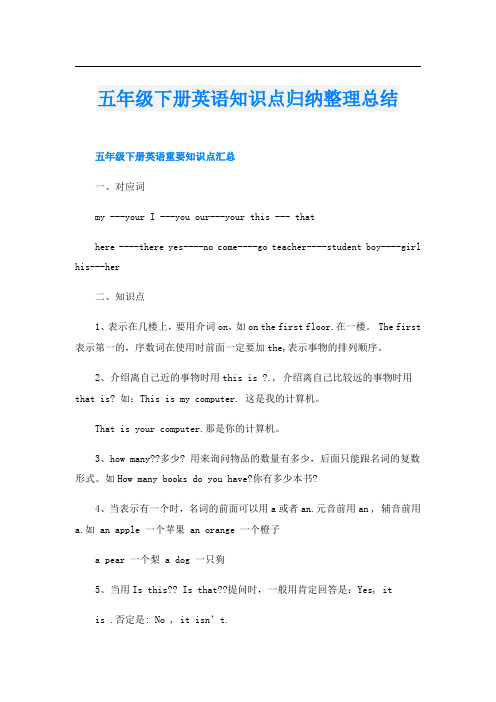
五年级下册英语知识点归纳整理总结五年级下册英语重要知识点汇总一、对应词my ---your I ---you our---your this --- thathere ----there yes----no come----go teacher----student boy----girl his---her二、知识点1、表示在几楼上,要用介词on,如on the first floor.在一楼。
The first 表示第一的,序数词在使用时前面一定要加the,表示事物的排列顺序。
2、介绍离自己近的事物时用this is ?., 介绍离自己比较远的事物时用that is? 如:This is my computer. 这是我的计算机。
That is your computer.那是你的计算机。
3、how many??多少? 用来询问物品的数量有多少,后面只能跟名词的复数形式。
如How many books do you have?你有多少本书?4、当表示有一个时,名词的前面可以用a或者an.元音前用an , 辅音前用a.如 an apple 一个苹果 an orange 一个橙子a pear 一个梨 a dog 一只狗5、当用Is this?? Is that??提问时,一般用肯定回答是:Yes, itis .否定是: No , it isn’t.三、句子:1、This is the teacher’s office.这是老师办公室。
2、That is my classroom.那是我的教室。
3、Go to the library. Read a story-book..去图书馆。
读故事书。
4、Is this the library? Yes, it is.这是图书馆吗?是的。
5Is that the art room? The art room is on the second floor.那是美术室吗?不是,美术室在二楼。
五年英语下册Unit 11重点内容(答案)
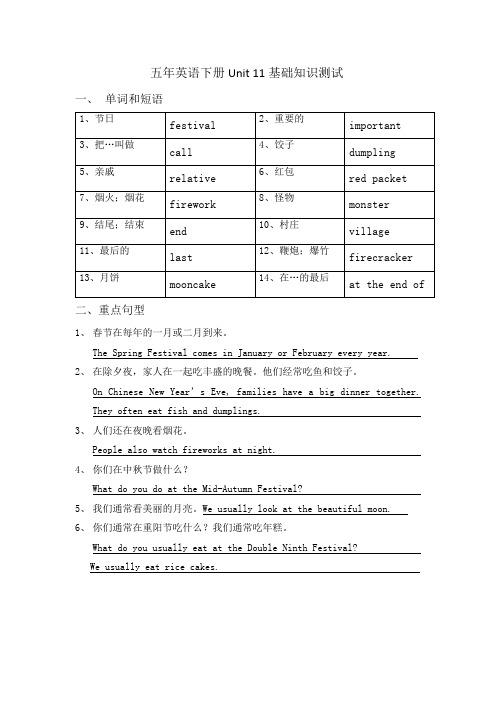
3、人们还在夜晚看烟花。
People also watch fireworks at night.
4、你们在中秋节做什么?
What do you do attheMid-Autumn Festival?
5、我们通常看美丽的月亮。We usually look at the beautiful moon.
6、你们通常在重阳节吃什么?我们通常吃年糕。
What do you usually eat at the Double Ninth Festival?
五年英语下册Unit 11基础知识测试
一、单词和短语
1、节日
festival
2、重要的
important
3、把…叫做
call
4、饺子
dumpling
5、亲戚
relative
6、红包
red packet
7、烟火;烟花
firework
8、怪物
monster
9、结尾;结束
end
10、村庄
village
11、最后的
We usually eat rice cakes.
ler
13、月饼
mooncake
14、在…的最后
at the end of
二、重点句型
1、春节在每年的一月或二月到来。
The Spring Festival comes in January or February every year.
2、在除夕夜,家人在一起吃丰盛的晚餐。他们经常吃鱼和饺子。
小学五年级英语下册各单元重点词语短语汇总
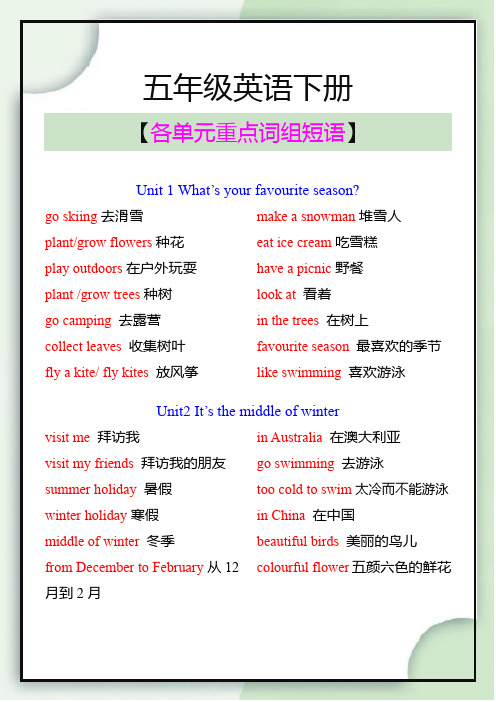
五年级英语下册【各单元重点词组短语】Unit 1 What’s your favourite season?go skiing去滑雪plant/grow flowers种花play outdoors在户外玩耍plant /grow trees种树go camping去露营collect leaves收集树叶fly a kite/ fly kites放风筝make a snowman堆雪人eat ice cream吃雪糕have a picnic野餐look at 看着in the trees 在树上favourite season最喜欢的季节like swimming 喜欢游泳Unit2 It’s the middle of wintervisit me 拜访我visit my friends 拜访我的朋友summer holiday 暑假winter holiday寒假middle of winter冬季from December to February从12月到2月in Australia 在澳大利亚go swimming去游泳too cold to swim太冷而不能游泳in China在中国beautiful birds美丽的鸟儿colourful flower五颜六色的鲜花Unit3 We are going to have an English testsee a film看电影have a party开一个聚会on June 11th在6月11日an English test一次英语考试tomorrow evening 明天晚上visit the museum参观博物馆anything else important其他重要的事情visit a farm参观农场have a sport meeting开校运会the school open day学校开放日New Year’s Day元旦Teachers’ Day 教师节Children’s Day 儿童节Women’s Day 妇女节May Day 劳动节Spring Festival 春节Christmas 圣诞节Mother’s Day 母亲节Tree Planting Day植树节Unit4 Have a good time in Hainanin Hainan在海南on Tuesday 在星期二for five days 持续五天的go for a picnic举行一次野餐all day 整天in the pool 在池里on the beach在海滩上under the stars 在星光下fly back home飞回家at noon在中午mountain climbing爬山have a good time过得愉快Unit 5 Would you like to go with us?plan to do计划去做go on a picnic去野餐at the school gate在学校门口see a film 看电影have a party举行一次聚会watch a football match 观看一场足球赛Unit 6 See you the partyinvite…to… 邀请…去做…call me on打我的电话at 2 p.m. 在下午两点钟at a surprise part在一个令人惊喜的聚会on this special day在这个特殊的日子里at the school meeting room在学校会议室Unit 7 We will go by trainon foot 步行the Great Wall 长城the Summer Palace颐和园take a walk 散步plan for the holiday假期计划go traveling去旅行go by train 乘火车去on October 2nd在10月2日come back home 回家ride a bike 骑自行车go boating 去划船see the picture show 看画展have fun娱乐visit Window of the World 参观世界之窗Unit8 Ben’s first trip to Beijingby plane乘飞机trip to Beijing去北京旅行fly back home 搭乘飞机回家by underground 乘地铁on Friday morning在星期五早上an exciting trip一次激动的旅行drive to the Great Wal l开车去长城in Wangfujing Street在王府井大街take a walk around the lake环湖散步Unit9 Be careful!come on来吧;快点;赶快watch out 注意fall down 跌倒in trouble 遇到麻烦the hot water 热水get sick 生病be careful 小心cut yourself 割伤你自己climb a tree 爬树eat a bad apple吃一个坏苹果touch a fan 摸风扇feed the animals喂动物get hurt 受伤help each other 互相帮助Unit 10 How to stay safecross the street过马路climb tall trees爬很高的树in the street在大街上during school hours在学校期间at the traffic lights在交通灯区on the stairs在楼梯上from strangers从陌生人那里safety crossing安全的路口take money拿钱safety first安全第一Stay safe保持安全Unit 11Can you tell me the wayover there 在那边the way to 去…的路turn right向右转turn left向左转at the second crossing在第二个十字路口on the left在左边on the right在右边next to the school 在学校的隔壁Excuse me. 劳驾;请原谅post office邮局You’re welcome.不客气We’re lost. 我们迷路go straight ahead直走train station 火车站police station警察局Unit 12 I know a shirt cutshort cut 捷径on time 及时;按时in front of 在…前面in ten minutes在十分钟内get there到达那里get to the cinema到达电影院out of their house从他们的房子走出来take the first right在第一个路口右转start to walk quickly开始赶快a different way一条不同的路the main street 大街主干walk through the park走路穿过公园。
英语五年级下册知识点汇总
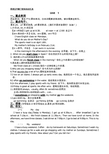
四会单词:课本P72黑体单词,白体词需要读准读熟,部分需要会默写。
二、重点句子:课本p4, p7要求背诵,p9要求熟读。
(请打开课本背诵吧!加油!)1.介词at, on, in的区别【at +时刻】I get up at 6:30. at noon = at 12:00 在正午【on+具体的一天】比如,on+星期,on+节日I have English class on Mondays.What do you do on Mother’s Day?The sports meet is on April 16th.My mother’s birthday is on February 21st.【in +季节,月份】I can swim in summer.in the morning/in the afternoon/in the evening 在早晨、在下午、在晚上2. When do you start class in Spain?你在西班牙什么时候开始上课?3. 询问某人什么时间做某事的句型When do you finish class in the morning?你们上午的课什么时候结束?4.表达某人某时间做某事的句型We finish class at 1 o’clock我们一点钟结束上午的课.5.Why are you shopping today? 你今天为什么购物?6.That sounds like a lot of fun.那听起来很有趣。
7.I live on an island. I always get up early every day. 我居住在一个岛上,我总是每天起很早。
8.I often go swimming in the water. 我经常在水里游泳。
9.In the afternoon, I play sports with my friend. 在下午,我和朋友进行体育运动。
PEP小学英语五年级下册各单元知识重点总结
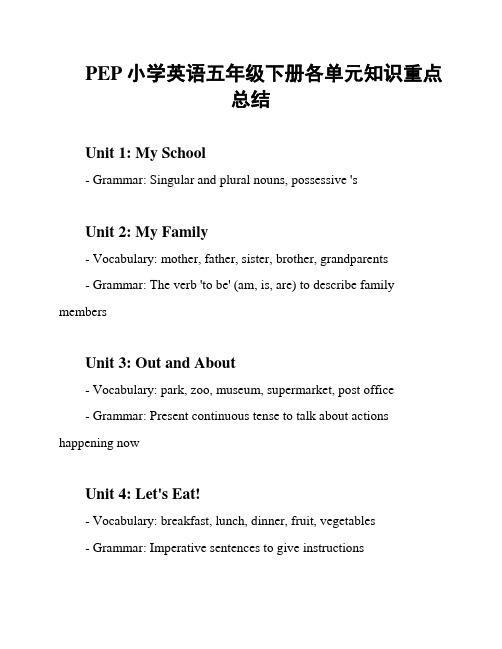
PEP小学英语五年级下册各单元知识重点总结Unit 1: My School- Grammar: Singular and plural nouns, possessive 'sUnit 2: My Family- Vocabulary: mother, father, sister, brother, grandparents- Grammar: The verb 'to be' (am, is, are) to describe family membersUnit 3: Out and About- Vocabulary: park, zoo, museum, supermarket, post office- Grammar: Present continuous tense to talk about actions happening nowUnit 4: Let's Eat!- Vocabulary: breakfast, lunch, dinner, fruit, vegetables- Grammar: Imperative sentences to give instructionsUnit 5: At the Farm- Vocabulary: farmer, barn, cow, pig, chicken- Grammar: There is/There are to talk about existenceUnit 6: Our Town- Vocabulary: street, hospital, police station, fire station, city- Grammar: Prepositions of place (in, on, under, behind, next to)Unit 7: Weather Report- Vocabulary: sunny, cloudy, rainy, snowy, windy- Grammar: Adjectives to describe weatherUnit 8: Fun with Friends- Vocabulary: play, sing, dance, swim, draw- Grammar: Simple present tense to talk about daily activitiesUnit 9: In the Ocean- Vocabulary: fish, dolphin, shark, octopus, seahorse- Grammar: Wh- questions using 'What' and 'Where'Unit 10: Happy Holidays- Vocabulary: Christmas, Easter, Halloween, New Year's Day, Thanksgiving- Grammar: Use of can for ability。
译林小学英语五年级(下册)(全册)重点(完美版)

11.Cinderella has a good time at the party. 灰姑娘在舞会上度过了美好时光。
12.Many girls try on the shoe, but it does not fit.许多女孩试穿这只鞋,但是不合适。
13.Why is Yang Ling not at school today? 杨玲为什么今天不在学校? 14.Why does Nancy take off her coat?南希为什么脱下她的外套?15.She leaves a shoe behind. 她留下一只鞋。
4.Bobby wants to show his bike to Sam.鲍比想要把他的自行车给山姆看。
解析:want to想要做某事,想要某物是want后面直接加某物,想要做某事“want+to+动词原形”。
四、语法 1. 询问某人住在哪里的句型:Where do/does…live?及其回答:…live/lives… ①一般情况下用“Where do…live?”和“...live…”来问和答。
②当主语是第三人称单数时,用“Where does…live?”和“...lives…”来问和答。
2. 询问某人如何到某地的句型“How do/does…”及其回答“...by/on…”。
①一般情况下用“How do…”和“...by/on…”来问和答。
②当主语是第三人称单数时,用“How does…”和“...by/on…”来问和答。
五、主要句子:1. Where do you live ? 你住在哪里? I live near school. 我住在学校附近。
2. How do you come to school? 你是怎么来上学的?I come to school by bike .我骑自行车来上学。
3. What about you ? 你呢?4. I live on Moon Street. 我住在月亮街。
完整版)外研版五年级英语下册重点句型和短语
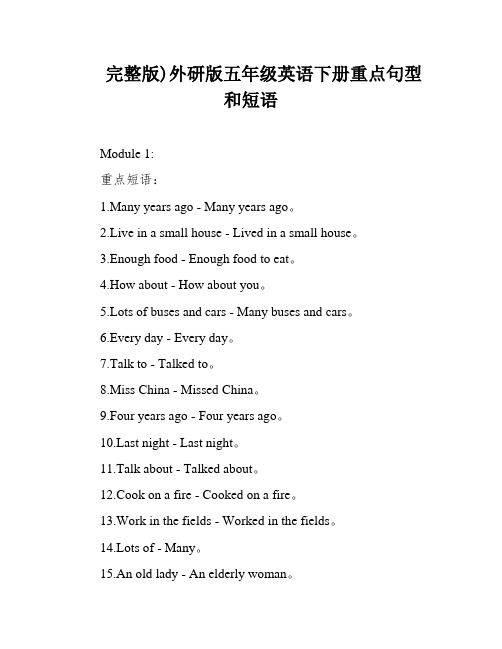
完整版)外研版五年级英语下册重点句型和短语Module 1:重点短语:1.Many years ago - Many years ago。
2.Live in a small house - Lived in a small house。
3.Enough food - Enough food to eat。
4.How about - How about you。
5.Lots of buses and cars - Many buses and cars。
6.Every day - Every day。
7.Talk to - Talked to。
8.Miss China - Missed China。
9.Four years ago - Four years ago。
st night - Last night。
11.Talk about - Talked about。
12.Cook on a fire - Cooked on a fire。
13.Work in the fields - Worked in the fields。
14.Lots of - Many。
15.An old lady - An elderly woman。
16.A programme about China - A program about China.重点句型:1.There was(were)+某人或某物+某地 - There was(were)+ XXX(即there be句型的过去式)如:There XXX’t any buses。
There were no buses。
(any意为“一些”用于否定句)2.XXX food。
- We didn't have enough food to eat.这里的didn’t为助动词,后接动词原形)3.Thank you for talking to us。
- Thank you for talking with us.for是介词,后接动词的ing形式。
小学英语五年级下Unit3知识要点
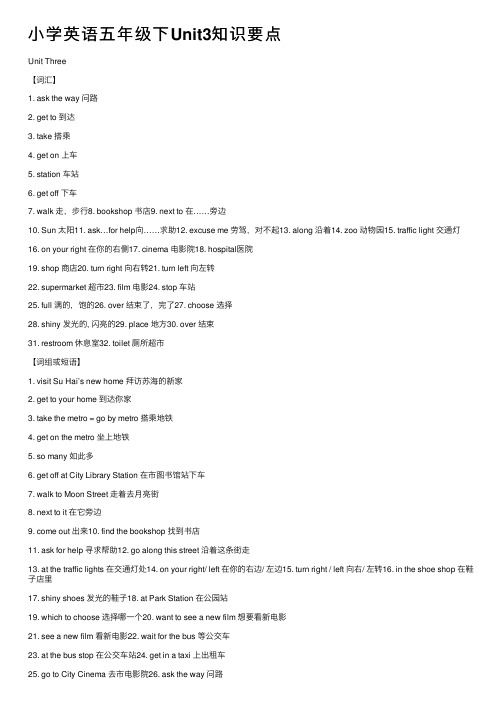
⼩学英语五年级下Unit3知识要点Unit Three【词汇】1. ask the way 问路2. get to 到达3. take 搭乘4. get on 上车5. station 车站6. get off 下车7. walk ⾛,步⾏8. bookshop 书店9. next to 在……旁边10. Sun 太阳11. ask…for help向……求助12. excuse me 劳驾,对不起13. along 沿着14. zoo 动物园15. traffic light 交通灯16. on your right 在你的右侧17. cinema 电影院18. hospital医院19. shop 商店20. turn right 向右转21. turn left 向左转22. supermarket 超市23. film 电影24. stop 车站25. full 满的,饱的26. over 结束了,完了27. choose 选择28. shiny 发光的, 闪亮的29. place 地⽅30. over 结束31. restroom 休息室32. toilet 厕所超市【词组或短语】1. visit Su Hai’s new home 拜访苏海的新家2. get to your home 到达你家3. take the metro = go by metro 搭乘地铁4. get on the metro 坐上地铁5. so many 如此多6. get off at City Library Station 在市图书馆站下车7. walk to Moon Street ⾛着去⽉亮街8. next to it 在它旁边9. come out 出来10. find the bookshop 找到书店11. ask for help 寻求帮助12. go along this street 沿着这条街⾛13. at the traffic lights 在交通灯处14. on your right/ left 在你的右边/ 左边15. turn right / left 向右/ 左转16. in the shoe shop 在鞋⼦店⾥17. shiny shoes 发光的鞋⼦18. at Park Station 在公园站19. which to choose 选择哪⼀个20. want to see a new film 想要看新电影21. see a new film 看新电影22. wait for the bus 等公交车23. at the bus stop 在公交车站24. get in a taxi 上出租车25. go to City Cinema 去市电影院26. ask the way 问路27. get to 到达28. See you later 再见29. Excuse me. 打扰⼀下30. on/ in the street 在街上31. walk along Sun Street 沿着太阳街⾛32. want to do sth. 想做某事33. go by bus = take the bus 坐汽车去34. The bus is full. 这车满了。
译林小学英语五年级(下册)(全册)重点
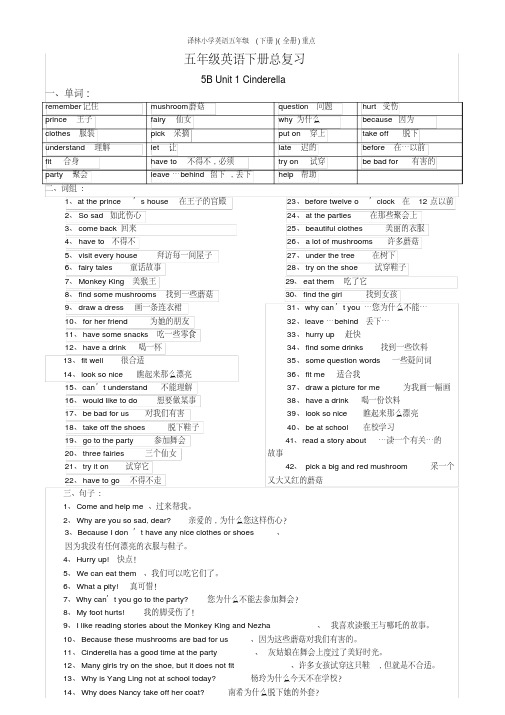
五年级英语下册总复习5B Unit 1 Cinderella一、单词:remember记住mushroom蘑菇question问题hurt受伤prince 王子fairy仙女why 为什么because 因为clothes服装pick 采摘put on 穿上take off 脱下understand 理解let 让late 迟的before 在…以前fit 合身have to 不得不,必须try on 试穿be bad for 有害的party 聚会leave…behind 留下,丢下help 帮助二、词组:1、at the prince’s house在王子的宫殿2、So sad 如此伤心3、come back回来4、have to不得不5、visit every house拜访每一间屋子6、fairy tales童话故事7、Monkey King 美猴王8、find some mushrooms找到一些蘑菇9、draw a dress画一条连衣裙10、for her friend 为她的朋友11、have some snacks吃一些零食12、have a drink喝一杯13、fit well 很合适14、look so nice瞧起来那么漂亮15、can’t understand不能理解16、would like to do想要做某事17、be bad for us 对我们有害18、take off the shoes 脱下鞋子19、go to the party 参加舞会20、three fairies 三个仙女21、try it on试穿它22、have to go不得不走23、before twelve o’clock 在12点以前24、at the parties在那些聚会上25、beautiful clothes 美丽的衣服26、a lot of mushrooms许多蘑菇27、under the tree 在树下28、try on the shoe试穿鞋子29、eat them 吃了它30、find the girl 找到女孩31、why can’t you…您为什么不能…32、leave…behind丢下…33、hurry up 赶快34、find some drinks 找到一些饮料35、some question words一些疑问词36、fit me 适合我37、draw a picture for me 为我画一幅画38、have a drink喝一份饮料39、look so nice 瞧起来那么漂亮40、be at school 在校学习41、read a story about…读一个有关…的故事42、 pick a big and red mushroom采一个又大又红的蘑菇三、句子:1、Come and help me、过来帮我。
五年级英语下册重点知识归纳

五年级英语下册重点知识归纳第一单元一、重点词汇。
eat breakfast 吃早餐have···class 上···课play sports 进行体育运动exercise 活动,运动do morning exercises 早锻炼eat dinner 吃晚饭clean my room 打扫我的房间go for a walk 散步go shopping 去购物take 学习,上(课)dancing 舞蹈take a dancing class 上舞蹈课a. m 上午p.m.下午ually 通常地二、其他日常活动。
get up 起床eat lunch 吃午饭go to bed 上床睡觉wash my face 洗脸wash my clothes 洗我的衣服watch TV 看电视play ping-pong 打乒乓球play the pipa 弹琵琶go swimming 去游泳go running 去跑步do homework 做作业do kungfu 练武术play football 踢足球play basketball 打篮球三、频度副词。
always 总是,一直(100%)usually 通常(80%)often 经常(60%)sometimes(30%)有时四、疑问词。
when 什么时候why 为什么五、重点句型。
1、询问别人什么时候做某事的句型及回答。
句型结构:问:When do you+动词短语原形+其他?(你/你们什么时候做某事?)2答:I/we(+频度副词)+动词短语原形+at+具体时间(我/我们通常在几点做某事。
)例:问:When do you go to bed?(你什么时候上床睡觉?)答:I go to bed at 9:00p.m (我晚上9 点上床睡觉。
)注意:当主语是第三人称单数(he,she,it,单个人名或单数名词)时,助动词do 要变成does,句型结构是:when does+主语(第三人称单数)+动词短语原形+其他?新课标第一网2、询问别人周末做什么的句型及回答。
五年级英语下册单词和重点句型

五年级英语下册单词和重点句型一、单词1.animal(动物)- a living creature such as a dog or cat that is not a human being例句:I love animals, especially dogs.2.cloud(云)- a white or grey mass in the sky, made up of very small floating drops of water例句:Look at the clouds in the sky, they are so beautiful.3.continue(继续)- to keep happening, existing, or doing something without stopping例句:The rain continued for several hours.4.exercise(锻炼)- physical activity that you do to make your body strong and healthy例句:I do exercises every morning to keep fit.5.fruit(水果)- something sweet that grows on a tree or bush and contains seeds or a stone covered by skin例句:I like to eat apples, oranges, and other fruits.6.island(岛屿)- a piece of land that is completely surrounded by water例句:We went to a beautiful island for our vacation.7.nature(自然)- everything in the physical world that is not controlled by humans, such as plants, animals, and natural events例句:I love spending time in nature, it helps me relax.8.picnic(野餐)- a meal that you have outside, often with friends, where you take food and drink with you例句:Let's have a picnic in the park this weekend.9.popular(受欢迎的)- liked by many people; frequently chosen or used例句:Harry Potter books are very popular among children.10.subject(科目)- an area of knowledge, especially one that you study at school, college, or university例句:My favorite subjects at school are English and Science.11.vegetable(蔬菜) - a plant or part of a plant that is eaten as food.例句:Eating vegetables is good for your health.12.mountain(山) - a large natural elevation of the earth's surface rising abruptly from the surrounding level; a large hill.例句:The mountains are covered with snow in winter.13.river(河) - a large natural stream of water flowing in a channel to the sea, a lake, or another river.例句:The river flows through the city.14.ocean(海洋) - a very large area of sea.例句:The ocean is full of mysteries.15.star(星星) - a celestial body that shines by its own light or byreflected light.例句:We can see many stars in the sky at night.16.moon(月亮) - the natural satellite of the earth.例句:The moon is full tonight.17.sun(太阳) - the star around which the earth and other planets revolve.例句:The sun is shining brightly.18.flower(花) - the reproductive structure of angiosperms, typically having brightly colored petals and a sweet fragrance.例句:The garden is full of beautiful flowers.19.book(书) - a written or printed work consisting of pages glued or sewn together along one side and bound in covers.例句:I love reading books.20.pen(钢笔) - an instrument for writing or drawing with ink.例句:I use a pen to write my diary.21.pencil(铅笔) - an instrument for writing or drawing made of a slender rod of graphite or a similar substance enclosed in a wooden casing.例句:I use a pencil to sketch.22.ruler(尺子) - an instrument for measuring or drawing straight lines.例句:I need a ruler to draw a straight line.23.eraser(橡皮) - an object used to remove pencil or ink marks from paper.例句:I can't find my eraser.24.backpack(背包) - a bag with shoulder straps, used to carry books andother items.例句:I carry my books in a backpack.25.desk(书桌) - a table, typically with drawers, at which one can read, write, or do other work.例句:My desk is messy.26.chair(椅子) - a seat with a back and legs, for one person.例句:I sit on a chair to study.27.classroom(教室) - a room in a school or college where classes are held.例句:The classroom is clean and tidy.28.teacher(老师) - a person who teaches, especially in a school.例句:My teacher is very kind.29.student(学生) - a person who is studying at a school or college.例句:I am a student.30.homework(家庭作业) - work that is assigned to students to be done outside of class.例句:I have a lot of homework to do.31.test(考试) - an examination of knowledge or skills, typically by means of questions and answers or practical exercises.例句:I am nervous about the test.32.grade(成绩) - a mark or score given for a piece of work or an examination. 例句:I got a good grade on my test.33.library(图书馆) - a building or room containing collections of books, periodicals, and sometimes films and recorded music for use or borrowing bythe public or a particular group.例句:I like to study in the library.34.bookstore(书店) - a shop that sells books.例句:I went to the bookstore to buy a new book.35.movie(电影) - a series of moving images, usually with sound, that tell a story.例句:I watched a movie last night.36.theater(剧院) - a building or outdoor area where plays and other dramatic performances are given.例句:We went to the theater to see a play.37.music(音乐) - an art form consisting of sound and silence, organized in time.例句:I love listening to music.38.instrument(乐器) - an object used to produce musical sounds.例句:He plays many instruments.39.singer(歌手) - a person who sings, especially professionally.例句:The singer has a beautiful voice.40.dance(舞蹈) - an art form consisting of movements of the body, usually in time to music.例句:She loves to dance.41.sport(运动) - an activity involving physical exertion and skill in which an individual or team competes against another or others.例句:I like to play sports.42.football(足球) - a game played by two teams of eleven players each, usinga round ball which players kick up and down the field in an attempt to score goals.例句:I play football with my friends.43.basketball(篮球) - a game played by two teams of five players each, usinga round ball which players try to throw through a hoop mounted on a backboard at each end of the court.例句:He is good at basketball.44.tennis(网球) - a game played by two or four players on a rectangular court, using a racket and a small, hollow rubber ball.例句:I play tennis on weekends.45.swimming(游泳) - the act of moving through water by using the arms and legs.例句:I go swimming every day.46.running(跑步) - the act of moving quickly on foot by alternately taking one foot off the ground and putting it down in front of the other.例句:I like running in the morning.47.cycling(骑自行车) - the act of riding a bicycle.例句:He goes cycling every weekend.48.hiking(徒步旅行) - the activity of going for long walks in the countryside.例句:We went hiking in the mountains.49.camping(露营) - the activity of spending a night or more outdoors in atent or other shelter.例句:I love camping in the summer.50.park(公园) - a public area of land set aside for recreation and enjoyment, usually with trees, grass, and flowers.例句:We went to the park to have a picnic.51.garden(花园) - a piece of land, usually near a house, used for growing flowers, vegetables, or other plants.例句:My grandmother has a beautiful garden.52.tree(树) - a large plant with a trunk, branches, and leaves.例句:There are many trees in the park.53.leaf(树叶) - a flattened structure growing from a stem or branch of a plant.例句:The leaves are turning red in autumn.54.flowerpot(花盆) - a container in which plants are grown.例句:I planted a flower in a flowerpot.55.bird(鸟) - a warm-blooded vertebrate animal that has feathers, wings, anda beak.例句:I saw a beautiful bird in the garden.56.fish(鱼) - a cold-blooded vertebrate animal that lives in water and has gills, fins, and a tail.例句:There are many fish in the river.57.insect(昆虫) - a small animal with six legs and a body divided into three parts.例句:I saw an interesting insect in the garden.58.butterfly(蝴蝶) - a flying insect with large, brightly colored wings.例句:The butterfly is very beautiful.59.bee(蜜蜂) - a flying insect that makes honey and pollinates flowers.例句:Bees are very busy.60.ant(蚂蚁) - a small insect that lives in colonies and is known for its hard work and organization.例句:Ants are very strong.61.house(房子) - a building for human habitation, usually consisting of a roof, walls, and floors.例句:I live in a big house.62.room(房间) - a part of a building enclosed by walls and a ceiling.例句:My room is very clean.63.kitchen(厨房) - a room or area where food is prepared and cooked.例句:My mother is cooking in the kitchen.64.bedroom(卧室) - a room where one sleeps.例句:I am sleeping in my bedroom.65.bathroom(浴室) - a room containing a bath or shower and often a toilet. 例句:I am taking a shower in the bathroom.66.living room(客厅) - a room in a house used for relaxing and entertaining guests.例句:We are watching TV in the living room.67.furniture(家具) - the movable articles that are used to make a room or building suitable for living or working.例句:We bought some new furniture for our house.68.table(桌子) - a piece of furniture with a flat top and one or more legs, used for eating, working, or playing games.例句:There is a vase on the table.69.chair(椅子) - a seat with a back and legs, for one person.例句:I am sitting on a chair.70.sofa(沙发) - a long, upholstered seat with a back and arms, for two or more people.例句:We are sitting on the sofa.71.bed(床) - a piece of furniture for sleeping or resting on.例句:I am lying on my bed.72.cupboard(橱柜) - a piece of furniture with shelves and doors, used for storing dishes, food, or other items.例句:There are many cups in the cupboard.73.drawer(抽屉) - a box-like compartment that slides in and out of a piece of furniture.例句:I keep my socks in a drawer.74.window(窗户) - an opening in a wall or roof to let in light and air.例句:The window is open.75.door(门) - a movable barrier used to close an opening in a wall or fence. 例句:I opened the door.76.floor(地板) - the surface of a room on which one stands or walks.例句:The floor is clean.77.ceiling(天花板) - the upper surface of a room, usually covered with plaster or other material.例句:The ceiling is high.78.wall(墙) - a vertical structure that divides or encloses an area.例句:The wall is painted white.79.color(颜色) - the visual perception of different wavelengths of light.例句:I like blue color.80.red(红色) - a bright color that is associated with heat, energy, and passion.例句:The rose is red.81.blue(蓝色) - a color that is associated with calmness, stability, and trust.例句:The sky is blue.82.green(绿色) - a color that is associated with nature, growth, and freshness.例句:The grass is green.83.yellow(黄色) - a bright color that is associated with sunshine, happiness, and optimism.例句:The sunflower is yellow.84.purple(紫色) - a color that is associated with royalty, luxury, and creativity.例句:The flower is purple.85.orange(橙色) - a bright color that is associated with energy, warmth, and enthusiasm.例句:The sunset is orange.86.white(白色) - a color that is associated with purity, innocence, and simplicity.例句:The snow is white.87.black(黑色) - a color that is associated with mystery, elegance, and power.例句:The cat is black.88.grey(灰色) - a color that is a mixture of black and white, and is associated with neutrality, balance, and stability.例句:The clouds are grey.89.brown(棕色) - a color that is associated with earth, stability, and reliability.例句:The bear is brown.90.pink(粉色) - a light red color that is associated with femininity, sweetness, and romance.例句:The dress is pink.91.clothes(衣服) - items of clothing.例句:I need to buy some new clothes.92.shirt(衬衫) - a garment for the upper body, typically with a collar, sleeves, and buttons down the front.例句:He is wearing a white shirt.93.pants(裤子) - an outer garment covering the body from the waist to the ankles.例句:I am wearing blue pants.94.skirt(裙子) - a garment for women or girls, hanging from the waist and usually reaching to the knees or ankles.例句:She is wearing a beautiful skirt.95.dress(连衣裙) - a one-piece garment for women or girls, typically with a skirt and bodice.例句:I bought a new dress.96.shoe(鞋子) - an outer covering for the foot, typically made of leather or other material.例句:I need to buy new shoes.97.sock(袜子) - a garment for the foot and lower leg, typically made of cotton or wool.例句:I am wearing white socks.98.hat(帽子) - a head covering.例句:He is wearing a black hat.99.gloves(手套) - a covering for the hand, typically with separate parts for each finger.例句:I am wearing gloves to keep my hands warm.100.coat(外套) - an outer garment, typically with sleeves and a fastening down the front.例句:I am wearing a warm coat.二、重点句型1. What's your favorite...?(你最喜欢的是什么…?)例句:What's your favorite color? - My favorite color is blue.这个句型用来询问对方最喜欢的事物,比如颜色、动物、食物等等。
五年级下册英语知识点整理
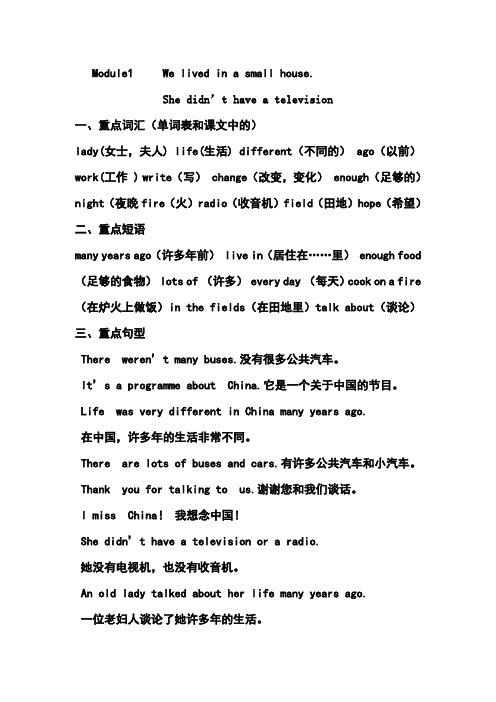
Module1 We lived in a small house.She didn’t have a television一、重点词汇(单词表和课文中的)lady(女士,夫人) life(生活) different(不同的) ago(以前)work(工作 ) write(写) change(改变,变化) enough(足够的)night(夜晚fire(火)radio(收音机)field(田地)hope(希望)二、重点短语many years ago(许多年前) live in(居住在……里) enough food (足够的食物) lots of (许多) every day (每天)cook on a fire (在炉火上做饭)in the fields(在田地里)talk about(谈论)三、重点句型There weren’t many buses.没有很多公共汽车。
It’s a programme about China.它是一个关于中国的节目。
Life was very different in China many years ago.在中国,许多年的生活非常不同。
There are lots of buses and cars.有许多公共汽车和小汽车。
Thank you for talking to us.谢谢您和我们谈话。
I miss China!我想念中国!She didn’t have a television or a radio.她没有电视机,也没有收音机。
An old lady talked about her life many years ago.一位老妇人谈论了她许多年的生活。
She couldn’t read or write. 她不会读也不会写。
四、自然拼读ai,ay /ei/ rain play al,au /ɔ: / walk autumn ar/ɑ:/ farmer party ar/ɔ:/ warm quarter五、背诵重点:课文第二部分六、语法点:过去式Module 2 She learnt English.Mr Li was a teacher.一、重点词汇learnt 学习(learn的过去式) foreign(外国的) studied 学习(study的过去式) language(语言) taught 教,讲授(teach 的过去式) wrote 写(write的过去式) dancer(舞蹈演员) hard (努力地)二、重点短语Foreign language(外语) learn English(学习英语) make a cake(做蛋糕)twenty years ago(二十年前)in his class(在他班里) a good pupil(一个好学生) an English teacher(一位英语老师) walk to school(步行去上学) by school bus(乘坐校车)三、重点句子Did she learn any foreign language她学过外语吗But he’s learning English now.但是他现在正在学习英语。
(完整版)译林版五年级下英语知识点

译林新版小学五年级下册知识点整理Unit 1知识点一、单词:because因为fairy仙女fit合适,合身have to不得不,必须mushroom蘑菇prince王子pick摘,拾take off脱下clothes衣服let让put on穿上understand明白,理解before在…以前late迟的try on试穿be bad for有害的pick摘leave…behind留下,丢下二、词组:去聚会at the party在聚会be sad伤心go to the party过得愉快come back回来take off脱下have a good timetry on试穿have to go必须走leave…behind留下,丢下在一棵树下look so nice看起来很漂亮在深林里under a treein the forest摘一个大红色的蘑菇对我们有害的pick a big red mushroomare bad for us没有漂亮的衣服或鞋子at the prince's house在王子的房子don't have any nice clothes or shoes三、句型:你为什么这么伤心?1. Why are you so sad ?因为我不能去参加聚会。
’t go to the party.2. Because I can3.Why?为什么?因为我没有漂亮的衣服或鞋子。
clothes and shoes.4.Because I don’t have any nice四、语法:can't = can not don't =do not知识点1:can的用法1)can表示能力,意思是“能,会”。
后面直接跟动词原形,用于一切人称和数。
Can的否定形式为can not,其缩写为“can’t。
如:We canspeak m uchEnglish now.我们现在能说英语了。
外研社小学英语五年级下学期期末复习重点

期末复习重点第一模块一、重点单词:life生活 different不同的 ago以前 any任何,一些 television 电视机 field田地 us我们宾格grandchildren外孙子女 radio收音机 fire炉火 grandmother外祖母 lady女士,夫人telephone电话hope希望二、重点短语及知识点:in China在中国 many years ago许多年前enough food充足的食物 lots of许多 watch TV看电视have got 有,拥有every day每天four years ago四年前 a television programme一个电视节目last night昨晚 talk about讨论on athe fire在火上in the fields在地里 live过去式lived a smallbig house一栋小大房子come现在分词comingare过去式were were否定形式weren’tdid否定形式didn’t change现在分词chingingis过去式was bus复数buses三、重点句型:1. We lived in a small house.我们住在一间小房子里;2.It’s a programme about China.它是一个关于中国的节目;3. Life was very different in China many years ago.许多年前中国的生活完全不同;4. There are lots of buses and cars.有许多公交车和小汽车;5.We live in a big house.我们住在一间大房子里;6.Yesterday I watched TV with my grandchildren.昨天我和孙子们一起看电视了;7. Thank you for talking to us. 谢谢您和我们谈话;for后面的动词要加+ing形式8. She didn’t have a television .她那时候没有电视;9. I watched a televison programme about China last night.昨晚我看了一个关于中国的访谈节目;10. An old lady talked about her life many years ago.一个年老的女士谈论了她许多年前的生活;11.She couldn’t read or write. 她不能读也不能写;could或者couldn’t后面要加动词原形否定句里要用 or,不用and 12. A:How was it different 有什么不同B:There weren’t any buses.那时候没有公交车;情景连线否定句和疑问句中要使用any,不能使用some13.A:Where were you three days ago 三天前你在哪里B: I was in Qiu Jiagou.我在邱家沟;情景连线14.A:What did you do there 你在那里干什么疑问句中有一个did 表示过去式,所以后面的动词要用原形,例如本句中的 do B: I played with my friends.我和我的朋友玩;情景连线第二模块一、重点单词:learntlearn的过去式学习 these这些 dancer舞蹈演员class班级 study学习hard努力的 retired退休的二、重点短语及知识点:Chinese city中国城市 city复数citiesforeign languages外语 five years ago五年前by school bus乘校车walk to school步行去学校read a book读书make a cake做蛋糕dance过去式danced learn过去式learntlearn现在分词learning make过去式madeteach过去式taught study过去式studiedgo三单goes dance名词dancer三、重点句型:1.A: Why is she wearing these clothes 她为什么要穿这些衣服呢B: Because she was a dancer.因为她是个舞蹈演员;重点加情连2.She danced in lots of Chinese cities.她在中国许多城市跳过舞;3. A: Did your grandma learn English 你奶奶学过英语吗B: Yes,she did.\No,she didin’t.情景连线4. He is learning English now.他现在正在学习英语;now表示现在进行时,所以learn后面+ing5. Chen Hai is an English teacher.陈海是一位英语老师;English前面要用an6.Now he goes to school by school bus.他现在坐校车去上学;三单7. A:Who are they 他们是谁B:They’re my grandparents.他们是我的爷爷奶奶;情景连线8. A: Who’s this 这是谁B:It’s my grandma.这是我奶奶;情景连线9. A: Is this your grandpa 这是你爷爷吗B: Yes,it is.是的;情景连线10.A:What did she do yesterday 她昨天干什么了B: She made a cake.她做了个蛋糕;情景连线第三模块一、重点单词:egg鸡蛋 email电子邮件 sandwich三明治 traditional传统的 delicious 美味的,可口的 hamburger汉堡 ateeat的过去式吃 gavegive的过去式给 tonight在今夜,今晚drankdrink的过去式二、重点短语及知识点:an email一封邮件 English food英国食物 an English breakfast一顿英国早餐 at school在学校a traditional English dinner一顿传统的英国晚餐 Chinese food中国食物 last night昨晚have过去式had do过去式did sandwich复数 sandwiches do第三人称单数doessay三单says eat过去式ate does否定形式doesn’t give过去式gave buy过去式bought三、重点句型:1.A:What did she have for breakfast 她早餐吃的什么B:She had eggs and sausages.她吃的鸡蛋和香肠;情景连线 2.I have got an email from Lingling.我收到玲玲的邮件;3.Yesterday she had an English breakfast.昨天她吃了一顿英国早餐;4.A:Does Lingling like English food 玲玲喜欢英国食物吗B: Yes,she does.\No,she doesn’t.是的,她喜欢;\不,她不;情景连线 5. A:What did you have for breakfast yesterday 你昨天早晨吃的什么 B:I had eggs我吃的鸡蛋;情景连线6. Today Sam ate six hamburgers at school.今天山姆在学校吃了六个汉堡包;7.We gave our hamburgers to Sam.我们把我们的汉堡包给了山姆;8. Tonight Mum is going to cook Chinese food for Lingling.今晚妈妈打算给玲玲做中国食物;9. A:What did you eat\drink last night 昨晚你吃的\喝的什么 B: I ate\drank…我吃的\喝的…情景连线10.A:What are you going to eat\drink tonight 你今晚打算吃\喝什么 B:I’m going to eat\drink…我打算吃\喝…情景连线第四模块一、重点单词:library图书馆 find找到 CD-ROM电脑光盘 bring带来,拿来 newspaper报纸 use使用card卡片 easy简单的 information信息 timetable时间表,时刻表 dictionary字典二、重点短语及知识点:make an e-card做电子卡片 good at 擅长于 go to the library去图书馆on Shelf C在C书架上library card图书证 bring back带回来 in two week’s time两周内 find out 找出 Chinese word汉字 in the timetable在信息表里 in the dictionary在字典里 on the CD-ROM在光盘上at the zoo在动物园in the newspaper在报纸上 on the computer在电脑上 on TV在电视上 buy过去式bought三、重点句型:1.A:Where are the books about computers,please 请问电脑书在哪里 B:They are on Shelf C.在C书架上;情景连线2. I want to make an e-card for Mum.我想给妈妈做一张电子卡片; want后面加to,to后面则用动词原形make; e-card前要用an修饰,不用a. 3.Let’s go to the library.让我们去图书馆吧;let’s后面加动词原形4.We can find a book about e-cards there.在那里我们能找到关于电子卡片的书;5. A: Can I have your library card,please 我能看一下你的借书证吗 B: Yes.Here you are.是的,给你;情景连线6.Please bring back the book in two weeks’time.请两周内还书;7. Where can you find out about animals 你能从哪里找到关于动物的书8.You can find out about Chinese food/words on this CD-ROM/in the dict ionary. 你在这张光盘\字典里找到关于中国的食物\汉字;9. There is also a CD-ROM in it.里面有一张光盘;在…里面要用in 10. I’m not good at it.我不擅长;good at 固定短语,擅长于 11. Here is a card for you.这是给你的卡片;for “为了…;给… 12. It’s easy with a computer. 电脑很简单;with“用…”第五模块一、重点单词:light轻的 broken坏的,破的 heavy重的 pocket口袋,兜儿 hard困难的二、重点短语及知识点:look at看,看一看 thank you very much非常感谢 I will缩写形式 I’ll big反义词small heavy反义词light new反义词broken easy反义词hard can否定形式can’t she宾格her三、重点句型:1.This black bag is nice.这个黑色的包不错;2.You can’t take it to China.你不能把它带回中国;3.I’ll buy you a new one.我会给你买个新的;4.This blue one is big and light.这个蓝色的既大又轻;5.It’ll be easy for heryou.它会很合适她你;6. It’s got a panda on it.上面有个熊猫;7. A: Have you got a small one,please 你有小一点的吗B:Yes, I have.\No,I haven’t.是的,我有;\不,我没有;情景连线8.A: Is it round 它是圆的吗 B:Yes, it is.\No,it isn’t.是的,它是;\不,不是;情景连线第六模块一、重点单词:photo照片 stay停留 week星期,周 parent父亲,母亲 rode骑马 horse 马 climb攀登,爬 holiday假日二、重点短语及知识点:last year去年 in the west og在…西边 play football踢足球 in July在七月 every year每年ride a horse骑马 go swimming去游泳 go过去式went photo复数photos do过去式didstay过去式stayed live第三人称单数lives ride过去式rode is过去式was have过去式had east东 west西south南north北三、重点句型:1. It’sXinjiang in the west of China.它新疆在中国的西部;2. We stayed with my grandmother for a week in July.七月我们和奶奶呆了一个星期;3. He lives there with his tree children.他和他的三个孩子住在那里;4. A: When did you go to Xinjiang 你们什么时候去的新疆 B: We went there in July.我们七月去的;情景连线5. A:Did you go with your mother and father 你和你爸妈一起去的吗 B:Yes,I did.\No,I didn’t.是,是的;\不,没有;情景连线 6. A:Where did you go for your holiday 你假期去哪里了 B:I went to Yinchuan.我去了银川;情景连线7.A: Can I see them,Lingling 我能看看他们吗,玲玲B: Of course.当然;情景连线 8.A:Who is this 这是谁B: It’s my uncle.是我的叔叔;情景连线9.The mountains are really beautiful.这些山实在是太漂亮了;mountain后加s,所以用are第七模块一、重点单词:message信息 another另一个 idea主意,想法 office办公室 busy忙碌的二、重点短语及知识点:send an email发送电子邮件 a computer message一条电脑信息 a good idea一个好主意 click on 点击 write your message写你的信息 at the office在办公室on the blackboard在黑板上see you later一会见,回头见写电子邮件的顺序:Click on“Email”点击邮件------- Click on“Write”点击书写---- Write your message.书写电子邮件--- Click on“Send”点击发送三、重点句型:1. It goes from one computer to another computer.它从一台电脑到另一台电脑;2. Let’s send an email to Dad.让我们给爸爸发送邮件吧3. The message will go to Dad’s computer at work.这条信息会在爸爸的电脑工作室发过去;4. I’ve got an email from little Tom.我收到了小汤姆的邮件;5. I will be home at seven o’clock.我七点回家;6. I am working very hard at the office.我在办公室努力的工作;第八模块一、重点单词:suggest 建议 quickly快地,迅速地 excited激动的,兴奋的 America美国 Chinese中国人kind种类 dragon 龙 same相同的 circle圆,圆圈二、重点短语及知识点:come quickly快点来 in the summer在夏天 a good idea一个好主意 a Chinese in the sea在大海里dragon kite一个中国龙风筝….the same as…和….一样三、形容词的比较级:一般形容词的比较级是在这个单词的后面加-erlong---longer short---shorter big---bigger small—smaller thin---thinner fat---fatter young---younger old---older tall--taller四、重点句型:1. What do you suggest 你有什么建议2. Daming is on the phone for you.大明电话找你;3. I’m going to go to America in the summer.今夏天我要去美国了;4. I want to take a present for my cousinbrother.我想给我堂兄兄弟带件礼物;5. Why don’t you give him a kite 你为什么不给他一个风筝呢6. How about a dragon kite 龙风筝怎么样7. Is Line A the same as Line B 线段 A 和线段 B 一样长吗 8. Is Circle A the same as Circle B 圆圈A和圆圈B 一样大吗9. Why don’t you wear a beautiful dress 你为什么不穿一件漂亮的连衣裙呢 10. I’m going to go to a party.我打算去一个聚会;第九模块一、重点单词:wore穿 women女人 actor演员 told讲,告诉 joke笑话 funny滑稽的 after在……以后 show演出 ready准备好的 soon不久 bed 床 room房间 history历史 question问题 borrow借来 evening傍晚二、重点短语及知识点:a lot 许多 in English 用英语 last week上周 lots of许多 go to a restaurant去饭馆last night昨晚the London Eye伦敦眼 in three weeks三周里 in the room在房间里Chinese history中国历史 Chinese songs中国歌曲 in the evenings在晚上 get过去式got go过去式went wear过去式wore tell过去式told is 过去式was eat过去式ate buy过去式bought read过去式read三、重点句型:1. I’ve got two letters in English.我收到两封英语信;2. Are you ready for your trip to America 你准备好你的美国之旅了吗3. The men wore women’s clothes.男人们穿着女人的衣服;4. The actors told lots of jokes.演员们讲了许多笑话;5. We laughed a lot.我们欢笑不止;6. After the show we went to a restaurant.演出结束后我们去了饭馆; 8. We are going to see you in three weeks.再三周我们就见面了;9. Dad is going to put another bed in my room. 爸爸打算在我的房间里再放一张床; 10. Don’t forget to bring CDs of Chinese songs.不要忘了带中国歌曲的光盘; 11. We can listen to them in the evenings. 我们能在晚上听;12. Dad is going to ask you some questions.爸爸要问你一些问题;13. Dad read a book about Chinese history. 爸爸读了一本关于中国历史的书; 14. Mum bought new chopsticks for you. 妈妈给你买了新筷子;第十模块一、重点单词:list目录,清单 airport机场 shoe鞋 ticket票 toothbrush牙刷 arrive 到达 taxi出租车 flat公寓 building建筑物 mademake过去式做 again再一次二、重点短语及知识点:in New York在纽约 a good idea好主意 go to the airport去机场 at the airport在机场 lots of许多 Chinese food中国食物 find out了解三、重点句型:1.A:Where are you going to go 你打算去哪里 B: To the airport.去机场;情景连线2. I’m going to meet you in New York.我回去纽约接你;3. Make a list of things to do.把你做的事情列一张清单;4.A: What are you going to take B: I’m going to take…情景连线5.A:When are you going to go to the airport 你打算什么时候去机场 B: I’m going to go to the airport at seven o’clock.我七点去机场;情景连线6.A:Who is going to go the airport 谁要去机场 B: It’s me.是我情景连线7. We went in a yellow taxi to their flat.我们坐一辆黄色的出租车去了他们的公寓;8.There are lots of tall buildings and lots of cars and people.有许多高楼大厦,车水马龙; 9. Grandma made Chinese food for you.奶奶给你做了中国食物; 10. But I want to try American food.但是我想试试美国食物; 11. It will be all right.没事的;注意be12. Everyone speaks English.每个人都说英语;注意speak后面要加s。
五年级英语下册重点知识归纳

五年级英语下册重点知识归纳重点知识归纳:五年级英语下册第一单元本单元的重点词汇包括:eat breakfast(吃早餐)、have class(上课)、play sports(进行体育运动)、exercise(活动、运动)、do morning exercises(早锻炼)、eat dinner(吃晚饭)、clean my room(打扫我的房间)、go for a walk(散步)、go shopping(去购物)、take(研究、上课)、dancing (舞蹈)、take a dancing class(上舞蹈课)、a.m.(上午)、p.m.(下午)和usually(通常地)。
除了以上词汇外,还有其他日常活动,如get up(起床)、eat lunch(吃午饭)、go to bed(上床睡觉)、wash my face(洗脸)、wash my clothes(洗我的衣服)、watch TV(看电视)、play ping-pong(打乒乓球)、play the pipa(弹琵琶)、go swimming(去游泳)、go running(去跑步)、do homework(做作业)和do kungfu(练武术)等。
在频度副词方面,有always(总是、一直,100%)、usually(通常,80%)、often(经常,60%)和sometimes(有时,30%)。
疑问词方面,重点是when(什么时候)和why(为什么)。
本单元的重点句型包括询问别人什么时候做某事的句型及回答和询问别人周末做什么的句型及回答。
对于第一种句型,问句结构为:When do you+动词短语原形+其他?回答结构为:I/we(+频度副词)+动词短语原形+at+具体时间。
需要注意的是,当主语是第三人称单数时,助动词do要变成does。
对于第二种句型,问句结构为:What do you do on the weekend?回答结构为:I(+频度副词)+动词(短语)+其他。
五年级英语下册期末复习重点
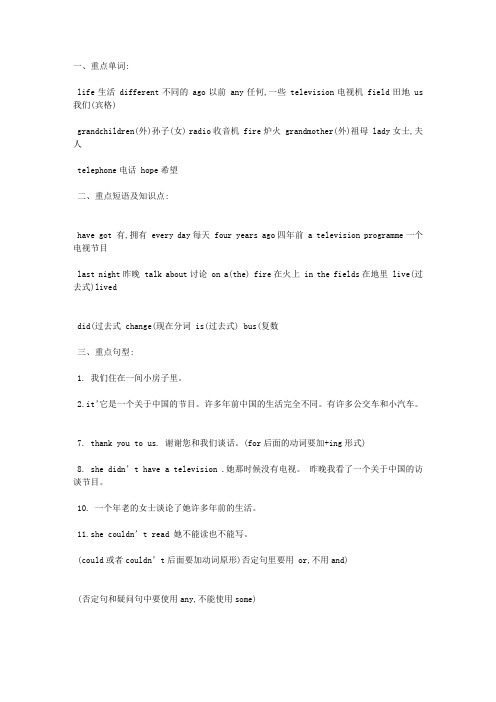
一、重点单词:life生活 different不同的 ago以前 any任何,一些 television电视机 field田地 us 我们(宾格)grandchildren(外)孙子(女) radio收音机 fire炉火 grandmother(外)祖母 lady女士,夫人telephone电话 hope希望二、重点短语及知识点:have got 有,拥有 every day每天 four years ago四年前 a television programme一个电视节目last night昨晚 talk about讨论 on a(the) fire在火上 in the fields在地里 live(过去式)liveddid(过去式 change(现在分词 is(过去式) bus(复数三、重点句型:1. 我们住在一间小房子里。
2.it’它是一个关于中国的节目。
许多年前中国的生活完全不同。
有许多公交车和小汽车。
7. thank you to us. 谢谢您和我们谈话。
(for后面的动词要加+ing形式)8. she didn’t have a television .她那时候没有电视。
昨晚我看了一个关于中国的访谈节目。
10. 一个年老的女士谈论了她许多年前的生活。
11.she couldn’t read 她不能读也不能写。
(could或者couldn’t后面要加动词原形)否定句里要用 or,不用and)(否定句和疑问句中要使用any,不能使用some)qiu jiagou.我在邱家沟。
(情景连线)第二模块一、重点单词:learnt(learn的过去式)学习 these这些 dancer舞蹈演员 class班级 study学习 hard 努力的retired退休的二、重点短语及知识点:dance( learn(过去式 learn(现在分词 make(过去式 teach(过去式) study(过去式 -go(三单 dance(名词)三、重点句型:因为她是个舞蹈演员。
五年级下册英语1到4单元知识点

五年级下册英语1到4单元知识点Unit 1: Holidays and festivals1. Vocabulary:- Holiday: A day when people do not go to work or school because of a special occasion.- Festival: A special time or event when people gather to celebrate something.- Celebrate: To do something special or enjoyable because of a special occasion.- Parade: A public celebration where people walk or drive along a route.- Costume: Special clothes that people wear for a party or festival.2. Grammar:- Present Simple Tense: Used to talk about habits, routines, facts, and general truths.- Adverbs of frequency: (Always, usually, often, sometimes, rarely, never) Used to show how often something happens.- Wh-questions: Questions that start with words like who, what, where, when, why, and how.3. Skills:- Reading: Understand different types of holidays and festivals around the world (e.g., Christmas, Thanksgiving, Chinese New Year).- Listening: Listen to conversations about holiday plans, traditions, and activities.- Speaking: Talk about favorite holidays and festivals and discuss how they are celebrated.- Writing: Write sentences and short paragraphs about holiday customs and traditions.Unit 2: Travelling1. Vocabulary:- Trip: A journey to a place and back again.- Journey: The act of traveling from one place to another.- Route: A way or course taken in getting from a starting point to a destination.- Vehicle: A machine that transports people or goods.- Sightseeing: To visit places of interest in a city or region.2. Grammar:- Present Continuous Tense: Used to talk about actions happening at the moment of speaking.- Imperatives: Commands or orders used to give instructions.- Prepositions of place: (In, on, at, by) Used to show the position or location of something.3. Skills:- Reading: Understand different types of transportation and travel destinations.- Listening: Listen to dialogues about booking tickets, planning trips, and giving directions.- Speaking: Describe travel experiences, ask for information, and give advice about traveling.- Writing: Write emails or postcards describing a recent trip, including details about accommodation, transportation, and sightseeing.Unit 3: Weather and seasons1. Vocabulary:- Weather: The condition of the atmosphere at a particular place and time.- Season: One of the four periods of the year (spring, summer, autumn, winter).- Temperature: How hot or cold the air is.- Forecast: A prediction of the weather in the future.- Sunny, cloudy, rainy, snowy: Different types of weather conditions.2. Grammar:- Present Continuous Tense: Used to talk about temporary actions happening now.- Comparative adjectives: (Bigger, smaller, hotter, colder) Used to compare two things.- Superlative adjectives: (The biggest, the smallest, the hottest, the coldest) Used to compare three or more things.3. Skills:- Reading: Understand the characteristics of each season and how they affect the weather.- Listening: Listen to weather forecasts, descriptions of seasons, and discussions about dressing for the weather.- Speaking: Talk about favorite seasons, describe typical weather in different seasons, and discuss clothing choices for different weather conditions.- Writing: Write short essays about favorite seasons, create weather forecasts, and describe seasonal activities and events.Unit 4: Animals and habitats1. Vocabulary:- Habitat: The natural home or environment of an animal, plant, or other organism.- Endangered: Threatened with extinction or destruction.- Species: A group of living organisms capable of interbreeding.- Predators: Animals that hunt and kill other animals for food.- Herbivores, carnivores, omnivores: Different types of animals based on their diet.2. Grammar:- Present Simple Tense: Used to talk about habits, routines, facts, and general truths.- Countable and uncountable nouns: Countable nouns can be counted (e.g., animals, trees), while uncountable nouns cannot be counted (e.g., water, air).- How much/many: Used to ask about the quantity of something (how much for uncountable nouns, how many for countable nouns).3. Skills:- Reading: Understand different types of animals and their habitats, including endangered species.- Listening: Listen to descriptions of animals, their behaviors, and their relationships with other animals.- Speaking: Talk about favorite animals, habitats, animal conservation, and animal-related activities.- Writing: Write reports about endangered animals, create posters about animal habitats, and describe animal behaviors and characteristics.。
PEP小学英语五年级下册各单元要点总结
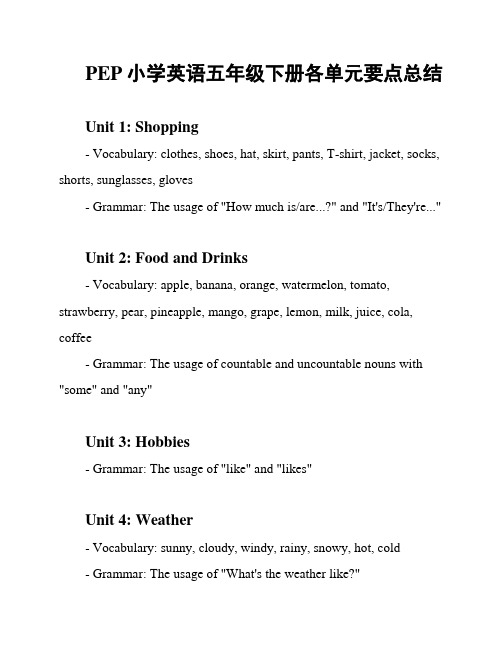
PEP小学英语五年级下册各单元要点总结Unit 1: Shopping- Vocabulary: clothes, shoes, hat, skirt, pants, T-shirt, jacket, socks, shorts, sunglasses, gloves- Grammar: The usage of "How much is/are...?" and "It's/They're..."Unit 2: Food and Drinks- Vocabulary: apple, banana, orange, watermelon, tomato, strawberry, pear, pineapple, mango, grape, lemon, milk, juice, cola, coffee- Grammar: The usage of countable and uncountable nouns with "some" and "any"Unit 3: Hobbies- Grammar: The usage of "like" and "likes"Unit 4: Weather- Vocabulary: sunny, cloudy, windy, rainy, snowy, hot, cold- Grammar: The usage of "What's the weather like?"Unit 5: Classroom- Vocabulary: desk, chair, blackboard, eraser, pencil, ruler, book, pen, bag, sharpener, glue, scissors- Grammar: The usage of prepositions "on", "in", and "under"Unit 6: Daily Routines- Vocabulary: get up, have breakfast, brush teeth, go to school, have lunch, do homework, have dinner, take a bath, go to bed- Grammar: The usage of present simple tense with daily routinesUnit 7: Jobs- Vocabulary: doctor, teacher, driver, police officer, firefighter, chef, engineer, artist, musician, journalist, scientist, astronaut- Grammar: The construction "What does he/she do?" and the usage of adjectives to describe jobsUnit 8: Animals- Vocabulary: dog, cat, bird, fish, rabbit, monkey, tiger, lion, elephant, panda, giraffe, snake, kangaroo- Grammar: The usage of "Can" to talk about abilitiesUnit 9: Festivals- Vocabulary: Spring Festival, Christmas, Thanksgiving, Easter, Halloween, Lantern Festival, Dragon Boat Festival, Mid-Autumn Festival, National Day- Grammar: The usage of "When is...?" and the construction "I like... because..."Unit 10: My City- Vocabulary: park, supermarket, hospital, school, post office, bank, library, restaurant, cinema, zoo, museum, airport, train station, subway - Grammar: The usage of prepositions "near", "next to", and "between"以上是PEP小学英语五年级下册各单元的要点总结。
小学五年级英语下册知识点总结

M10U1-------重点词组:1. this weekend 这个周末2. I don’t know 我不知道3. I think so 我也这样认为4. all right 没事,没问题5. make a list of things to do 列一个要做事情的清单6. safe trip 旅行安全,一路顺风7. feel nervous 感觉到紧张重点句型:1.Where are you going this weekend, Sam?萨姆你这个周末要去哪里?2.When are you going to get up ?你将要什么时候起床?3.Mum ,what did you say to me ?妈妈,你刚刚对我说了什么?4.Are you ready for your trip tomorrow ?你准备好你明天的旅行了吗?5.I’m going to meet you in New York .我将要在纽约接你。
6.You can make a list of things to do .你可以列一个要做事情的清单7.What are you going to take ? 你将要带什么东西?8.When are you going to the airport?你什么时候去机场?9.Who’s going to the airport with you ?谁将要跟你一起去?U2-------重点词组:1. arrive there 到那2. at the airport 在机场3. take a yellow taxi 乘坐一辆黄色出租车4. lots of tall building 许多高大的建筑物5. find out 找到、发现6. a big exciting word 一个令人激动的大世界7. by plane 乘飞机8. have a party 举办一个聚会9. sing a song 唱一首歌10. play a game 玩个游戏11. make a plan 制作一个计划12. at the zoo 在动物园里13. take lots of photos 照了许多照片重点句型:1.I’m in New York now. 我现在在纽约。
- 1、下载文档前请自行甄别文档内容的完整性,平台不提供额外的编辑、内容补充、找答案等附加服务。
- 2、"仅部分预览"的文档,不可在线预览部分如存在完整性等问题,可反馈申请退款(可完整预览的文档不适用该条件!)。
- 3、如文档侵犯您的权益,请联系客服反馈,我们会尽快为您处理(人工客服工作时间:9:00-18:30)。
——Some seeds travel in winter, and others travel with people and animals.
一些种子靠水传播,其它的靠人和动物传播。
三、语音(三会)
sadschoolsmallsnowspringsquarestarsweetswim dress
每年圣诞节去。
7.——How often do you visit your grandparents ?
你多长时间去看望一次爷爷奶奶?
——Every summer.
每年夏天去。
8.——How often do you have chess lessons ?
你多长时间去上一次围棋课?
——Every Friday.
11.making things制作东西
12.making clothes做衣服
一个植物的不同部分用英语怎么说?
——They are the roots, the stem, the leaves, the flowers, and the seeds.
它们分别是根,茎,叶,花朵和种子。
2.——What do flowers do?
花的作用是什么?
——They make seeds.
6.listening to English songs听英文歌曲
7.washing clothes洗衣服
8.doing homework做作业
9.playing basketball打篮球
10.playing football踢足球
11.dancing跳舞
12.watching TV看电视
13.watching a basketball game看篮球比赛
14.neighbour邻居
15.man男人
16.uncle叔叔;伯父
17.grandpa爷爷;外公
18.grandma奶奶;外婆
19.father爸爸
20.parents父母
21.husband丈夫
22.visit your grandparents看望你的祖父母
23.have chess lessons上国际象棋课
UNIT ONE
WHAT ARE YOU DOING?
一、单词与词组
1.practicing my English练习英语
2.chatting with my friends和朋友聊天
3.drawing a picture画画
4.doing crafts做手工
5.reading the textbook看课本
二、句子
1.——He is eighteen years older thanIam.
他比我大18岁。
——Iam six years older than he is.
我比他大6岁。
——Iam six years younger than he is.
我比他小6岁。
2.——Who’s that baby boy?
比如:花生,西红柿,土豆,卷心菜和胡萝卜。
5.——Can you give me an example of the sweet fruits?
能给我举个甜水果的例子吗?
——For example, peaches, apples, and watermelons.
比如:桃子,苹果和西瓜。
6.——How do seeds travel?
——They need candy, drinks, and toys.
他们需要糖果,饮料和玩具。
7.——What do they need to cook the dinner?
他们做晚饭需要什么?
——They need potatoes, tomatoes, and eggs.
他们需要土豆,西红柿和鸡蛋。
21.sunlight阳光
22.air空气
23.water水
24.hold the party举办聚会
25.candy糖果
26.drinks饮料
27.toys玩具
28.cook the dinner做晚饭
29.eggs鸡蛋
二、句子
1.——What’s the English for the different parts of a plant?
它们可以结出种子。
3.——What do seeds do?
种子的作用是什么?
——They grow up to be plants and trees.
它们可以长成植物和树。
4.——What do trunks do?
树干的作用是什么?
——They hold the trees above the ground.
他是鲍勃,麦克的一个叔叔。
5.——Who’s this little girl?
那个小女孩是谁?
——She’s Xinxin, Lingling’s cousin.
她是欣欣,玲玲的堂妹。
6.——How often do you see your cousins ?
你多长时间去看一次你的堂兄?
——Every Christmas.
2.make paper caps制作纸帽子
3.newspaper报纸
4.make a bag做一个袋子
5.old jacket旧夹克
6.make chairs with the wood用树木制作椅子
7.build houses建造房子
8.make use of…利用;使用
9.example例子
10.carrots胡萝卜
那个男婴是谁?
——He’s Jack, my nephew.
他是杰克,我的外甥。
3.——Who’s that old lady?
那个老太太是谁?
——She’s Mrs. Li, my neighbour.
她是李太太,我的邻居。
4.——Who’s that man?
那个男人是谁?
——He’s Bob, one of Mike’s uncles.
我们能怎样利用树木?
——We can get fruits from trees.
我们可以从树上摘到水果。
2.——How can we make use of newspaper?
我们能怎样利用报纸?
——We can make paper cap.
我们可以制作纸帽子。
3.——How can we make use of the old jacket?
——They are putting candles on the cake.
他们正在把蜡烛插到蛋糕上。
——Two boys are fishing.
两个男孩儿正在钓鱼。
——Some old people / old women are dancing.
一些老奶奶在跳舞。
三、语音词(三会)
quiet安静的quarter一刻钟quartz石英queen女王question问题quick快速的square正方形earthquake地震
UNIT TWO
WHAT DO FLOWERS DO?
一、单词与词组
1.roots根
2.stem茎
3.leaves ( leaf )叶子
4.flowers花
5.seeds种子
6.clock时钟
puter电脑
8.screen屏幕
9.keyboard键盘
10.mouse鼠标
11.face表面
12.long hand分针
22.putting candles on the cake把蜡烛放到蛋糕上
23.having a good time过得愉快
24.fishing钓鱼
25.playing hide-and-seek捉迷藏
26.cooking做饭
27.taking photos拍照
二、句子
1.——What are you doing?
14.talking谈话
15.playing chess下象棋
16.playing the piano弹钢琴
17.making a model制作模型
18.practicingkung fu练习功夫
19.playing badminton打羽毛球
20.playing baseball打棒球
21.having a birthday party举办生日会
一、单词与词组
1.pilot飞行员
2.professor教授
3.dentist牙医
4.artist艺术家
5.barber理发师
6.football player足球运动员
7.football coach足球教练
8.basketball player篮球运动员
9.engineer工程师
10.policeman警察
你在干什么?
——I’m practicing my English.
我正在练习英语。
2.——What is Mike doing?
迈克/他/她在干什么?
——He is watching a basketball game.
他/她正在看篮球比赛。
3.——What are they doing?
他们在干什么?
23.sandwiches三明治
24.travel in water靠水传播
25.travel with people and animals靠人和动物传播
26.travel with wind靠风传播
27.travel with birds靠鸟传播
